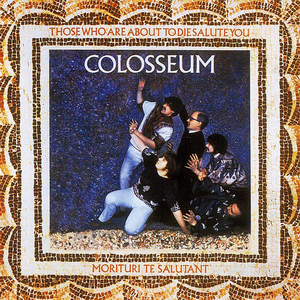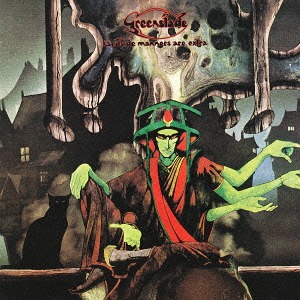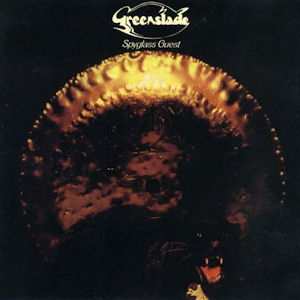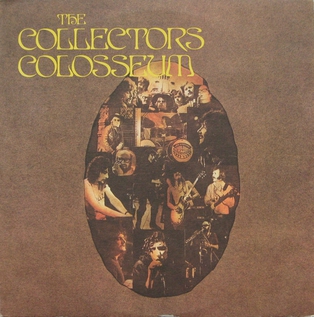GRIMMS was an English pop rock, comedy, and poetry group, originally formed as a merger of The Scaffold with core members of the Bonzo Dog Band and the Liverpool Scene for two concerts in 1971 at the suggestion of John Gorman.
The Graham Bond Organisation (GBO) were a British jazz/rhythm and blues group of the mid-1960s consisting of Graham Bond, Jack Bruce (bass), Ginger Baker (drums), Dick Heckstall-Smith and John McLaughlin (guitar). They recorded several albums and further recordings were issued when the group's members achieved fame in progressive rock and jazz fusion. The spelling of the band's original name varied between releases, often depending on the intended audience. The British English spelled as "Organisation" or "ORGANisation", while in some other countries outside the UK spelled "Organization".

Colosseum are an English jazz rock band, mixing blues, rock and jazz-based improvisation. Colin Larkin wrote that "the commercial acceptance of jazz rock in the UK" was mainly due to the band. Between 1975 and 1978 a separate band Colosseum II existed playing progressive rock.

Philip John Albert "Jon" Hiseman was an English drummer, recording engineer, record producer, and music publisher. He played with the Graham Bond Organisation, with John Mayall & the Bluesbreakers and later formed what has been described as the "seminal" jazz rock/progressive rock band, Colosseum. He later formed Colosseum II in 1975.
Colosseum II was a British progressive jazz-rock band formed in 1975 by former Colosseum drummer and bandleader Jon Hiseman, which featured guitarist Gary Moore.

Valentyne Suite is the second album released by the band Colosseum. It was Vertigo Records' first album release, and reached number 15 in the UK Albums Chart in 1969. The album peaked at number 18 in Australia in 1970.

Colosseum Live is a live album by Colosseum, released in 1971. It was one of the band's most commercially successful albums, remaining in the UK Albums Chart for six weeks and peaking at number 17. The album peaked at number 48 in Australia in 1972.

LiveS The Reunion Concerts 1994 is a live album by English progressive jazz-rock band Colosseum. It includes two tracks from their reunion concert at the Zelt-Musik-Festival in Freiburg, Germany and six tracks from the second reunion concert at the E-Werk in Cologne, Germany.

David John Greenslade is an English composer and keyboard player. He has played with Colosseum from the beginning in 1968 until the farewell concert in 2015 and also from 1973 in his own band, Greenslade, and others including If and Chris Farlowe's Thunderbirds.

Ralph Anthony MacDonald was a Trinbagonian-American percussionist, steelpan virtuoso, songwriter, musical arranger, and record producer.

Those Who Are About to Die Salute You – Morituri Te Salutant is the debut album by Colosseum, released in 1969 by Fontana. It is one of the pioneering albums of jazz fusion. The title is a translation of the Latin phrase morituri te salutant that according to popular belief, gladiators addressed to the emperor before the beginning of a gladiatorial match.

Bedside Manners Are Extra is the second studio album by English progressive rock band Greenslade, released in November 1973 by Warner Bros. Records. The cover artwork was designed by renowned artist Roger Dean, who had previously collaborated with the band on their debut album.

Greenslade is an eponymous studio album by British progressive rock band Greenslade, released in 1973, and their first album. The artwork for the album cover is by Roger Dean. The album has seven tracks comprising six songs and one instrumental with a vocal track.
Barefoot Jerry is an American country rock band from Nashville, Tennessee. Fusing country music and progressive rock, they have been described as a seminal southern rock band. The band was most active from 1971 to 1977. It was composed of area studio musicians under the tutelage of Wayne Moss and Mac Gayden. Barefoot Jerry was named after a country fiddle player who performed inside a store next to Gayden's home in the Smoky Mountains.

Spyglass Guest is the third studio album by British progressive rock band Greenslade, released in 1974. It is their most commercially successful album to date, having reached number 34 in the UK Albums Chart. It was the final recording bassist Tony Reeves made with the group, leaving Greenslade shortly after the LP was completed.
Anthony Reeves is an English bass guitarist/contrabassist, noted for his "distinctive and complex bass sound" and use of electronic effects.

The Collectors' Colosseum is a compilation album by Colosseum that was released in England in 1971.

Time and Tide is the fourth studio album of the British progressive rock band Greenslade, released in 1975 on Warner Bros. Records. The artwork for the album cover is by Patrick Woodroffe. The album was released in the US on the Mercury Records label.

Cactus Choir is the first solo album by British keyboardist Dave Greenslade, released in 1976 soon after the disbandment of his own eponymous band, Greenslade. His Greenslade bandmate Tony Reeves also plays on half of the album's tracks. The artwork for the cover is by Roger Dean.
Dave Lawson is an English keyboardist and contemporary composer who in the 1970s was a member of UK progressive rock band Greenslade.














